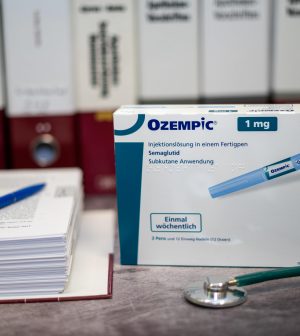- Could Your Grocery Store Meat Be Causing Recurring UTIs?
- Are You Making This Expensive Thermostat Error This Winter?
- Recognizing the Signs of Hypothyroidism
- 10 Strategies to Overcome Insomnia
- Could Artificial Sweeteners Be Aging the Brain Faster?
- Techniques for Soothing Your Nervous System
- Does the Water in Your House Smell Funny? Here’s Why
- Can a Daily Dose of Apple Cider Vinegar Actually Aid Weight Loss?
- 6 Health Beverages That Can Actually Spike Your Blood Sugar
- Treatment Options for Social Anxiety Disorder
Should Kids Take Ozempic, Wegovy? The Idea Has Some Experts Worried

Weight-loss drugs like Ozempic and Wegovy are surging in popularity, but that doesn’t mean they’re good for everyone.
Glucagon-like peptide-1 receptor agonists (GLP-1RA) may be dangerous for children, warned researchers at University of California, Irvine.
Treating childhood obesity and type 2 diabetes with these injected medications may have unintended and adverse consequences in pediatric patients, the team of clinicians, exercise scientists, pharmaceutical scholars, ethicists and behavioral experts said in their commentary.
While the new class of medication could benefit children with morbid obesity and type 2 diabetes — a problem worsened by COVID pandemic-related shutdowns — the authors suspect overuse and abuse among youth is inevitable.
“Our major concern is the unbalance and inappropriate reductions in calorie or energy intake associated with these weight-loss drugs,” said Dr. Dan Cooper, a professor of pediatrics at UCI School of Medicine.
“Unlike in adults, children and adolescents need energy and sufficient calories not only for physical activity, but for growth and development,” he said in a university news release.
The balance of a proper diet plus movement influences a child’s growth and health across their life span, according to the authors. Any change in the balance can have negative health consequences much later in life.
Optimal diet and exercise, for example, helps build bones during childhood, for example. This lessens risk of osteoporosis and bone fractures later in life.
There’s also the potential for abuse of the medications by kids and teens with eating disorders and those involved in competitive sports like wrestling, martial arts, gymnastics and ballet.
Co-author Jan Hirsch, dean of the UCI School of Pharmacy and Pharmaceutical Sciences, said the benefits of long-term use in youth need to be weighed against cost and the impact on quality of life. A careful study is needed, she said.
“With the increase in social media, young people are already exposed to a diet culture and body images which may not be attainable and, ultimately, unhealthy,” Hirsch said in the release. “These drugs administered without proper supervision could cause a minefield of health and emotional problems for children as they age.”
Cooper pointed out that pediatric obesity has become an epidemic because of a lack of places for kids to play and exercise safely, and the wide availability of cheap, high-calorie fast foods.
This epidemic has hit underrepresented minorities especially hard.
As drug manufacturers develop oral forms of the medications, this may reduce oversight and lead to abuse, the researchers warned.
“News about GLP-1RA agonists has infiltrated social media outlets, and is being spoken about by celebrities, fashion models and influencers. It’s reasonable to assume that as access becomes easier, more children will engage in unsupervised use of GLP-1RA agonists in order to facilitate reaching societal beauty standards,” said Dr. Emma Cooper, a resident in the Department of Psychiatry and Human Behavior at UCI School of Medicine.
“As the rate of mental health disorders, including eating disorders, continues to rise, health care providers should be screening for and intervening on inappropriate use of these medications,” Cooper said.
The commentary was recently published in the Journal of Clinical and Translational Science.
More information
The U.S. Centers for Disease Control and Prevention has more on childhood obesity.
SOURCE: University of California, Irvine, news release, Aug. 28, 2023
Source: HealthDay
Copyright © 2026 HealthDay. All rights reserved.










